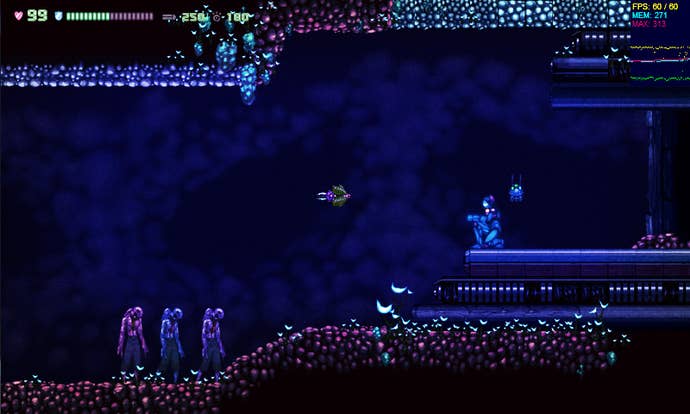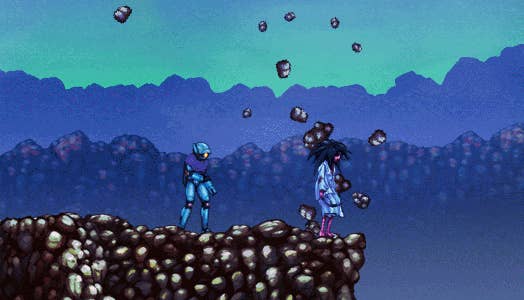Ghost Song: When Metroid Meets Dark Souls
We talk to Matt White about divergent combat and a moon that is also a necromancer.
This article first appeared on USgamer, a partner publication of VG247. Some content, such as this article, has been migrated to VG247 for posterity after USgamer's closure - but it has not been edited or further vetted by the VG247 team.
"It's a darker game than Metroid."
Matt White is talking about his upcoming 'metroidvania'-inspired Ghost Song. Set on a moon that White has likened to an extraterrestrial Bermuda Triangle, Ghost Song is a blue-tinted marriage of Metroid and Dark Souls. Though hardly the name under every outlet's fingertips, it's hard not to be, at the very least, modestly curious about what White has labeled his 'obsession'.
"Ghost Song started as sort of a shell of a Metroidvania, a bit over a year ago. It began bereft of most details, and was powered by a love of the genre." White writes in an e-mail interview. "I just wanted to see what kind of cool mechanics I could get going. I recall trying to figure out who is in the suit. Eventually, a light bulb appeared over my head. Maybe, nobody is inside the suit? Maybe, it's a ghost."
According to popular mythos, apparitions remain shackled to the physical plane for a reason. Be it revenge or love or any of the gamut of emotions humanity can experience, there is always something locking such spirits in place. White's exploration of that exact idea is what instigated the rest of the fiction: the ghost of the dead returned to set things right. "This is easy to understand and adjacent to this concept are a whole stable of easily accessible emotional themes. Love, tragedy, hope, redemption and closure."
Over the last year or so, White released a number of GIFs, screenshots and tech demos correlating to his upcoming project. Though the last are no longer publicly available (White removed them in order to be able to exert control over his game assets and images), the still-available GIFs make it impossible not to note the resemblance between the central protagonist and the iconic Samus Aran.
"The similarities are hard to ignore, and I consider this to be acceptable." White says. "I recall making the half-joking refrain that Nintendo hadn't released a 'true' Metroid game in about a decade, and this was my cathartic response."
What began as a comparatively small metroidvania game eventually developed an identity of its own. By then, however, the power suit and the built-in arm cannon became integral to the story. So, he kept them. This isn't to say that White didn't make an attempt at escaping Aran's design. He remade the suit four times. In the end, White settled on what he felt was a compromise. "Rather than viewing those similarities as a negative, I'm content for players of the game and myself to nod at each other knowingly in acknowledgement of the homage."
White's fondness for Metroid evidences itself in more than just the aesthetics. It's in the minimalist storytelling, in the sprawling subterranean world that demands exploration, and, to some extent, the combat system. There is the basic cannon, which can be aimed with directional controls in a manner similar to Metroid, and an 'alternate fire' option that provides access to a diverse armament - if you can find said weapons first, of course. But the resemblances end there. White is hoping to make far more divergent combat. Light RPG elements - critical hits, incremental damage modification from power-ups, floating damage numbers and more - are in the process being worked into Ghost Song as are special moves that go beyond basic maneuvers like dash or double jump.

"Make no mistake, I do have some of those contrivances in the game, but I'm attempting to mix them up a bit. For example, my dash move -- Ghost Dash -- Is an avoidance move, it phases you out of solid matter. Later, you can optionally find a power up for it that causes it to suck energy out of enemies you travel through and temporarily empower your cannon. I'm also in the process of trying to make the combat a bit more tactile and physical than it is now. I'm going to add knock downs, knock backs, and even a melee attack. This is all in an effort to further make the game have its own feel."
Speaking of 'feel', how does Dark Souls factor into the equation?
"It's dangerous to ask me about Dark Souls, because I'll just start talking and I may never stop. Dark Souls was a massively influential game for me. It took so much established game design dogma and threw it out into the street -- And it feels so good. It taught me that you can do things like hide a huge, lovely, optional area behind the least obvious illusionary wall ever made, placed in the corner of the deepest part of the world. Hey, that's a thing. Who knew?"
He adds, "[Dark Souls] taught me that great things can be made missable, and that's fine. It taught me that it doesn't have to be the game's job to monitor you and make sure you see and do everything and ultimately succeed."
This is not to say that Ghost Song will be a roguelike in sheep's clothing. White says that he has no intention of making Ghost Song unduly difficult. He just wants to make it a good challenge - enough to catalyze a genuine desire in players to go out and find things that can ease their struggle. Nonetheless, even without such incentive, Ghost Song remains a place that begs exploration.

The entire moon, according to White, is essentially an necromantic agent. Those who die here will inevitably and inexplicably be brought back to a monstrous, shambling half-life of some variety. More disturbingly, perhaps, is that it is not a simple desecration of their physical forms. Much like their remains, the ghosts of those who perish on the moon are chained to it, forced to remain until their 'zombie' is destroyed. And those same rules apply to the rare NPCs that players may encounter.
"If they are unfortunate, you may eventually encounter their less-alive self." White remarks ominously.
Originally intended to a Flash game, Ghost Song has long outgrown its initial scope. The first few iterations were a solitary project, crafted in Stencyl to the best of White's ability. Nonetheless, rather than prune his expanded creation, White says he's thinking about making it bigger and better. He wants to port the game to Unity, re-do the art so as to have it better fit higher resolution screens, and add more features. To accomplish this, he has enlisted the aid of long-time collaborator Roger Hicks and is planning to launch a Kickstarter 'soonishly'.
"If I no longer have to worry about how to make something work, and just focus on design, it'll be pretty liberating. There won't be many limits."
Keep track of Ghost Song by bookmarking its official website.


